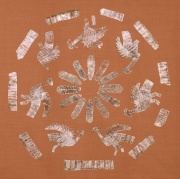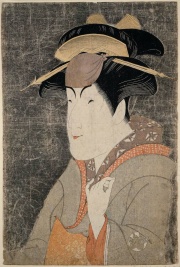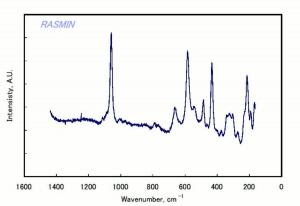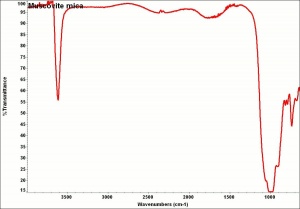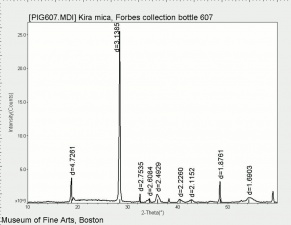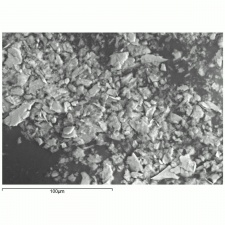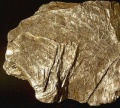Difference between revisions of "Mica"
(username removed) |
(username removed) |
||
| Line 2: | Line 2: | ||
== Description == | == Description == | ||
| − | A group of silicate minerals that cleave into thin, flexible sheets. Mica minerals range in color from colorless to black. They are composed of potassium aluminum silicates ([http://cameo.mfa.org/materials/fullrecord.asp?name=muscovite muscovite]) and may also contain magnesium ([http://cameo.mfa.org/materials/fullrecord.asp?name=phlogopite phlogopite]), chromium ([http://cameo.mfa.org/materials/fullrecord.asp?name=fuchsite fuchsite]), iron ([http://cameo.mfa.org/materials/fullrecord.asp?name=biotite biotite]), and lithium ([http://cameo.mfa.org/materials/fullrecord.asp?name=lepidolite lepidolite]). Mica is mined commercially in India, Canada, Malagasy Republic, Brazil, and Argentina. Ground mica is used in paper, paints, and ceramic glazes to increase gloss and add sparkle. It has been used as a replacement for bronze powder in some metallic paints. Mica is also used as a filler in plastics, wallboard, mortar, and asphalt shingles. Sheets of mica were at one time used as small windows for houses ([http://cameo.mfa.org/materials/fullrecord.asp?name=Muscovy | + | A group of silicate minerals that cleave into thin, flexible sheets. Mica minerals range in color from colorless to black. They are composed of potassium aluminum silicates ([http://cameo.mfa.org/materials/fullrecord.asp?name=muscovite muscovite]) and may also contain magnesium ([http://cameo.mfa.org/materials/fullrecord.asp?name=phlogopite phlogopite]), chromium ([http://cameo.mfa.org/materials/fullrecord.asp?name=fuchsite fuchsite]), iron ([http://cameo.mfa.org/materials/fullrecord.asp?name=biotite biotite]), and lithium ([http://cameo.mfa.org/materials/fullrecord.asp?name=lepidolite lepidolite]). Mica is mined commercially in India, Canada, Malagasy Republic, Brazil, and Argentina. Ground mica is used in paper, paints, and ceramic glazes to increase gloss and add sparkle. It has been used as a replacement for bronze powder in some metallic paints. Mica is also used as a filler in plastics, wallboard, mortar, and asphalt shingles. Sheets of mica were at one time used as small windows for houses ([http://cameo.mfa.org/materials/fullrecord.asp?name=Muscovy%20glass Muscovy glass]); now thin sheets are used as windows in electrical equipment. It is also used as a fireproofing material, an agent in fire extinguishers, and as an electrical insulator. |
[[File:41.262-C43305CR-d1.jpg|thumb|]] | [[File:41.262-C43305CR-d1.jpg|thumb|]] | ||
| Line 9: | Line 9: | ||
Muscovy glass; isinglass stone; muscovite (colorless); phlogopite (brown); fuchsite (green); lepidolite (pink, lilac); biotite (black); glauconite (green); paragonite; apophyllite; Glimmer (Deut., Sven.); mika (Gr.); micare (Lat.); miki (Pol.); mica (Esp., Fr., It., Ned., Port.); | Muscovy glass; isinglass stone; muscovite (colorless); phlogopite (brown); fuchsite (green); lepidolite (pink, lilac); biotite (black); glauconite (green); paragonite; apophyllite; Glimmer (Deut., Sven.); mika (Gr.); micare (Lat.); miki (Pol.); mica (Esp., Fr., It., Ned., Port.); | ||
| − | [[[SliderGallery rightalign|apophyliteRS.jpg~Raman|PIG607.jpg~XRD|f607sem.jpg~SEM|f607edsbw.jpg~EDS]]] | + | [[[SliderGallery rightalign|apophyliteRS.jpg~Raman|Muscovite micaj1.jpg~FTIR|PIG607.jpg~XRD|f607sem.jpg~SEM|f607edsbw.jpg~EDS]]] |
== Other Properties == | == Other Properties == | ||
| Line 46: | Line 46: | ||
File:pa20607apophylite.jpg|Apophylite | File:pa20607apophylite.jpg|Apophylite | ||
File:fuchsiteF5.jpg|Fuchsite | File:fuchsiteF5.jpg|Fuchsite | ||
| − | |||
</gallery> | </gallery> | ||
| Line 52: | Line 51: | ||
== Authority == | == Authority == | ||
| − | * ''Encyclopedia Britannica'', http://www.britannica.com Comment: Retrieved June 5, 2003, from | + | * ''Encyclopedia Britannica'', http://www.britannica.com Comment: Retrieved June 5, 2003, from Encyclopædia Britannica Premium Service. |
| − | * | + | * R. J. Gettens, G.L. Stout, ''Painting Materials, A Short Encyclopaedia'', Dover Publications, New York, 1966 |
| − | * | + | * G.S.Brady, ''Materials Handbook'', McGraw-Hill Book Co., New York, 1971 Comment: p. 505 |
| − | * | + | * Ralph Mayer, ''A Dictionary of Art Terms and Techniques'', Harper and Row Publishers, New York, 1969 (also 1945 printing) |
* ''Dictionary of Building Preservation'', Ward Bucher, ed., John Wiley & Sons, Inc., New York City, 1996 | * ''Dictionary of Building Preservation'', Ward Bucher, ed., John Wiley & Sons, Inc., New York City, 1996 | ||
| − | * | + | * Robert Fournier, ''Illustrated Dictionary of Practical Pottery'', Chilton Book Company, Radnor, PA, 1992 |
* Wikipedia, the free encyclopedia, at http://www.wikipedia.com Comment: http://en.wikipedia.org/wiki/Mica (Accessed Sept. 10, 2005) | * Wikipedia, the free encyclopedia, at http://www.wikipedia.com Comment: http://en.wikipedia.org/wiki/Mica (Accessed Sept. 10, 2005) | ||
| − | * | + | * Michael McCann, ''Artist Beware'', Watson-Guptill Publications, New York City, 1979 |
| − | * | + | * Jack Odgen, ''Jewellery of the Ancient World'', Rizzoli International Publications Inc., New York City, 1982 |
* ''The American Heritage Dictionary'' or ''Encarta'', via Microsoft Bookshelf 98, Microsoft Corp., 1998 | * ''The American Heritage Dictionary'' or ''Encarta'', via Microsoft Bookshelf 98, Microsoft Corp., 1998 | ||
| − | * | + | * Richard S. Lewis, ''Hawley's Condensed Chemical Dictionary'', Van Nostrand Reinhold, New York, 10th ed., 1993 |
* ''CRC Handbook of Chemistry and Physics'', Robert Weast (ed.), CRC Press, Boca Raton, Florida, v. 61, 1980 Comment: density=2.6-3.2 | * ''CRC Handbook of Chemistry and Physics'', Robert Weast (ed.), CRC Press, Boca Raton, Florida, v. 61, 1980 Comment: density=2.6-3.2 | ||
Revision as of 06:49, 24 July 2013
Description
A group of silicate minerals that cleave into thin, flexible sheets. Mica minerals range in color from colorless to black. They are composed of potassium aluminum silicates (muscovite) and may also contain magnesium (phlogopite), chromium (fuchsite), iron (biotite), and lithium (lepidolite). Mica is mined commercially in India, Canada, Malagasy Republic, Brazil, and Argentina. Ground mica is used in paper, paints, and ceramic glazes to increase gloss and add sparkle. It has been used as a replacement for bronze powder in some metallic paints. Mica is also used as a filler in plastics, wallboard, mortar, and asphalt shingles. Sheets of mica were at one time used as small windows for houses (Muscovy glass); now thin sheets are used as windows in electrical equipment. It is also used as a fireproofing material, an agent in fire extinguishers, and as an electrical insulator.
Synonyms and Related Terms
Muscovy glass; isinglass stone; muscovite (colorless); phlogopite (brown); fuchsite (green); lepidolite (pink, lilac); biotite (black); glauconite (green); paragonite; apophyllite; Glimmer (Deut., Sven.); mika (Gr.); micare (Lat.); miki (Pol.); mica (Esp., Fr., It., Ned., Port.);
Other Properties
Tetragonal system with tabular, cube-like or prismatic crystals.
Perfect cleavage in one direction. Fracture = uneven. Luster = pearly, iridescent. Streak = white to colorless
| CAS | 12001-26-2 |
|---|---|
| Mohs Hardness | 2.0 - 5.0 |
| Density | 2.7-3.2 |
| Refractive Index | 1.563; 1.604; 1.599 |
Hazards and Safety
May contain silica which could produce silicosis by inhalation.
Buckeye Fire Equipment: MSDS
Additional Images
Authority
- Encyclopedia Britannica, http://www.britannica.com Comment: Retrieved June 5, 2003, from Encyclopædia Britannica Premium Service.
- R. J. Gettens, G.L. Stout, Painting Materials, A Short Encyclopaedia, Dover Publications, New York, 1966
- G.S.Brady, Materials Handbook, McGraw-Hill Book Co., New York, 1971 Comment: p. 505
- Ralph Mayer, A Dictionary of Art Terms and Techniques, Harper and Row Publishers, New York, 1969 (also 1945 printing)
- Dictionary of Building Preservation, Ward Bucher, ed., John Wiley & Sons, Inc., New York City, 1996
- Robert Fournier, Illustrated Dictionary of Practical Pottery, Chilton Book Company, Radnor, PA, 1992
- Wikipedia, the free encyclopedia, at http://www.wikipedia.com Comment: http://en.wikipedia.org/wiki/Mica (Accessed Sept. 10, 2005)
- Michael McCann, Artist Beware, Watson-Guptill Publications, New York City, 1979
- Jack Odgen, Jewellery of the Ancient World, Rizzoli International Publications Inc., New York City, 1982
- The American Heritage Dictionary or Encarta, via Microsoft Bookshelf 98, Microsoft Corp., 1998
- Richard S. Lewis, Hawley's Condensed Chemical Dictionary, Van Nostrand Reinhold, New York, 10th ed., 1993
- CRC Handbook of Chemistry and Physics, Robert Weast (ed.), CRC Press, Boca Raton, Florida, v. 61, 1980 Comment: density=2.6-3.2
- Art and Architecture Thesaurus Online, http://www.getty.edu/research/tools/vocabulary/aat/, J. Paul Getty Trust, Los Angeles, 2000
